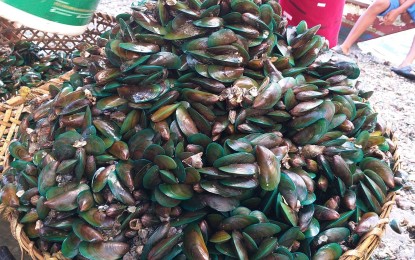
STERN WARNING. Green mussels collected in Maqueda Bay in Jiabong, Samar. The Bureau of Fisheries and Aquatic Resources has issued another warning against the consumption of shellfish with several areas in Eastern Visayas still infested with red tide. (PNA file photo)
TACLOBAN CITY – The Bureau of Fisheries and Aquatic Resources has issued another warning against the consumption of shellfish as several areas in Eastern Visayas are still infested with red tide.
In an advisory issued on Thursday, BFAR said shellfish meat collected in nine bays in the region are infected with the red tide while seawater samples from four bays have been contaminated with red tide toxins.
Under shellfish bulletin no. 23, listed as positive for paralytic shellfish poisoning (PSP) are Maqueda Bay affecting the towns of Jiabong, Motiong, Paranas, San Sebastian, Calbiga, Pinabacdao, and Hinabangan in Samar; Villareal Bay in Villareal, Samar; and Carigara Bay in Babatngon, San Miguel, Barugo, Carigara, and Capoocan in Leyte.
Also included are the coastal waters of Daram, Samar; San Pedro Bay in Basey, Samar; Matarinao Bay in General MacArthur, Hernani, Quinapondan, and Salcedo in Eastern Samar; Cancabato Bay in this city; coastal waters of Zumarraga, Samar; and Irong-irong Bay in Catbalogan, Samar.
Laboratory examination conducted by BFAR regional marine biotoxin laboratory here and in Catbalogan City in Samar found pyridinium bahamense, a toxic microorganism that causes PSP in four bays in the region.
These are the coastal waters of Biliran Island; Cambatutay Bay in Tarangnan, Samar; coastal waters of Leyte, Leyte; and coastal waters of Guiuan, Eastern Samar.
“To protect the public, we issue this warning as precautionary advice to the public to refrain from gathering, selling, and eating all types of shellfishes,” BFAR said.
The fisheries bureau also banned the trading and consumption of Acetes sp. locally known as "alamang" harvested from said bays to avoid possible shellfish poisoning.
Local government units are advised to regulate the gathering, marketing, and transport of shellfish from the infested areas.
"Fish, squid, shrimp, and crab are safe to eat “provided that they are fresh and washed thoroughly and internal organs such as gills and intestines are removed before cooking", the advisory added.
On Oct. 13, a four-year-old girl died and four other children from Catbalogan City were rushed to a hospital after eating red tide-infected shellfish.
In Daram, Samar, two children died and four of their family members were hospitalized on Sept. 13 after eating red tide-infected green mussels.
Also in Daram town, six people were rushed to a hospital on Oct. 10 after suffering severe PSP symptoms such as numbness, vomiting, and abdominal pain.
Red tide is a term used to describe a phenomenon where the water is discolored by high algal biomass or the concentration of algae. PSP occurs from ingesting bivalve shellfish (such as mussels, oysters, and clams) that contain toxins. (PNA)
